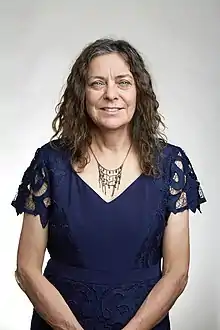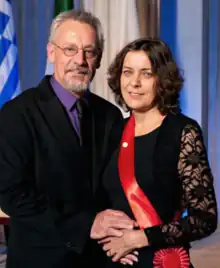Jillian Banfield
Jillian Fiona Banfield FRS FAA (born Armidale, Australia) is professor at the University of California, Berkeley with appointments in the Earth Science, Ecosystem Science and Materials Science and Engineering departments.[3] She leads the Microbial Research initiative within the Innovative Genomics Institute, is affiliated with Lawrence Berkeley National Laboratory and has a position at the University of Melbourne, Australia.[3] Some of her most noted work includes publications on the structure and functioning of microbial communities and the nature, properties and reactivity (especially crystal growth) of nanomaterials.[1][4][5]
Jill Banfield | |
|---|---|
 Jillian Banfield at the Royal Society admissions day in July 2018 | |
| Born | Jillian Fiona Banfield 18 August 1959 |
| Alma mater | Australian National University (BSc) Johns Hopkins University (PhD) |
| Awards | V. M. Goldschmidt Award (2017) Dana Medal (2010) |
| Scientific career | |
| Fields | |
| Institutions | University of Melbourne University of Wisconsin–Madison University of Tokyo University of California, Berkeley |
| Thesis | HRTEM studies of subsolidus alteration, weathering, and subsequent diagenetic and low-grade metamorphic reactions (1990) |
| Doctoral advisor | David R. Veblen[2] |
| Website | nanogeoscience |
Early life and education

Banfield was educated at the Australian National University where she completed her bachelor's[6] and master's degrees[7] (1978–1985) both examining granite weathering. She attributes her initial interest in geomicrobiology to Dr Tony Eggleton who drew her attention to processes at the earth's surface, mineral weathering and the regolith.[8]
Banfield graduated with a PhD in Earth and Planetary Sciences from Johns Hopkins University for high-resolution transmission electron microscopy (HRTEM) studies of metamorphic reactions supervised by David R. Veblen.[2][9]
Career and research
Banfield is an earth scientist who studies the structure, functioning and diversity of microbial communities in natural environments and the human microbiome.[3] Banfield was part of a group that discovered a process called environmental transformation sequencing, which is a way to manipulate and identify the changeable microbes in a community.[10] Using environmental transformation sequencing, the group was able to understand how easy it is to genetically modify different bacteria species, using a numerical method.[10] Her laboratory and collaborators pioneered the reconstruction of genomes from natural ecosystems and community metaproteomic analyses.[3] Through genomics, her group has provided insights into previously unknown and little known bacterial and archaeal lineages, leading to a new rendition of the Tree of Life.[3] She has conducted extensive research on natural and synthetic nanomaterials, exploring the impacts of particle size on their structure, properties and reactivity.[3] Her lab described the oriented attachment-based mechanism for growth of nanoparticles and its implications for development of defect microstructures.[3] She has also studied microorganism-mineral interactions, including those that lead to production of nanomaterials.[3]
Banfield was a Fulbright Student in Medicine from the Australian National University to Johns Hopkins University in 1988,[11] and a Mac Arthur Fellow in 1999.[12] She has been a professor at the University of Wisconsin–Madison from 1990 to 2001 and the University of Tokyo (1996–1998).[9] Since 2001, she has been a researcher and professor at the University of California Berkeley[13] where she heads the geomicrobiology program and works as a researcher at the Lawrence Berkeley National Laboratory. Her research as of 2021 spans field sites in Northern California to Australia and covers subjects at the intersection of microbiology and geosciences, including genome-resolved metagenomics, genome editing tool development, astrobiology and microbial carbon capture.[14][15] In 2023, Banfield became the first woman to win the Leeuwenhoek Medal from the Royal Dutch Society for Microbiology, an award that that has been given roughly every 10 years since 1875 to honor scientists who have made outstanding contributions to science, society and outreach in the field of microbiology.[16]
Honours and awards
- 2023 Leeuwenhoek Medal[16]
- 2018 Elected a Fellow of the Royal Society (FRS).[3]
- 2017 V.M. Goldschmidt Award, Geochemical Society
- 2015 Elected to the Australian Academy of Science (International Member)
- 2015 Honor doctorate, Ben Gurion University, Israel[17]
- 2013 Award of Dr. sch. h.c. ETH Zurich, Switzerland
- 2011 L'Oréal-UNESCO Awards for Women in Science: North American Laureate
- 2011 Benjamin Franklin Medal in Earth and Environmental Science of the Franklin Institute[18]
- 2010 Dana Medal of the Mineralogical Society of America[19]
- 2007 Elected Fellow, The Geochemical Society[20]
- 2007 ASM Division Q Lecturer (Environmental and General Applied Microbiology)
- 2006 Elected Fellow, American Academy of Microbiology[21]
- 2006 Elected to the National Academy of Sciences
- 2005 Pioneer Lecturer, Clay Minerals Society,[22] June 2005
- 2005 Rosenqvist Lecturer, Norway, May 2005
- 2000 Inaugural NSF Earth Science Week Lecturer
- 2000 Gast Lecturer, Geochemical Society[23]
- 2000 John Simon Guggenheim Foundation Fellowship[24]
- 2000 Marion L. and Christie M. Jackson Award of the Clay Minerals Society[25]
- 1999 Fellow through 2004 MacArthur Foundation[26]
- 1999 Faculty Achievement Award, UW-Madison
- 1999 D.A. Brown Medal, Australian National University[27]
- 1998 H.I. Romnes Faculty Fellowship UW Madison[28]
- 1997 Mineralogical Society of America Award[29]
- 1988 Fulbright Scholar in Medicine at Johns Hopkins University[30]
References
- Jillian Banfield publications indexed by Google Scholar
- Banfield, Jillian Fiona (1990). HRTEM studies of subsolidus alteration, weathering, and subsequent diagenetic and low-grade metamorphic reactions (PhD thesis). Johns Hopkins University. OCLC 224273093. ProQuest 303872775.
- Anon (2018). "Professor Jillian Banfield FRS". royalsociety.org. London: Royal Society. One or more of the preceding sentences incorporates text from the royalsociety.org website where:
All text published under the heading 'Biography' on Fellow profile pages is available under Creative Commons Attribution 4.0 International License." --Royal Society Terms, conditions and policies at the Wayback Machine (archived 2016-11-11)
- "Jill F. Banfield". Earth and Planetary Science.
- "Jillian BANFIELD". Our Environment at Berkeley.
- Rickard, Michael John (2010). Geology at ANU (1959–2009): Fifty Years of History and Reminiscences. Canberra: ANU E Press. p. 117. ISBN 9781921666667.
- Banfield, Jillian F. (1985). The mineralogy and chemistry of granite weathering (MSc thesis). Australian National University.
- "News Interview: Professor Jillian Banfield, Armidale-born international award recipient". ABC Sydney. 10 November 2010. Retrieved 15 March 2017.
- "Jill F. Banfield | Curriculum Vitae". eps.berkeley.edu. Retrieved 20 April 2016.
- Mozumdar, Deepto; Csörgő, Bálint; Bondy-Denomy, Joseph (22 February 2022). "Genetic Manipulation of a CAST of Characters in a Microbial Community". The CRISPR Journal. 5 (1): 4–6. doi:10.1089/crispr.2022.29142.dmo. ISSN 2573-1599. PMC 9009589. PMID 35119310.
- "MacArthur Fellowship Recipients | Bureau of Educational and Cultural Affairs". eca.state.gov. Retrieved 8 October 2018.
- "Class of 1999 – MacArthur Foundation". macfound.org. Retrieved 8 October 2018.
- "Jill F. Banfield". Earth and Planetary Science. Retrieved 24 April 2020.
- "Jillian Banfield -Departments of Earth and Planetary Science and Environmental Science, Policy, and Management, UC Berkeley". Earth and Environmental Sciences Area. Retrieved 15 March 2017.
- "IGI Launches New Research in Net-Zero Farming & Carbon Capture". Innovative Genomics Institute (IGI). Retrieved 15 September 2021.
- Microbiologie, Koninklijke Nederlandse Vereniging voor. "van Leeuwenhoek Medal 2023". KNVM. Retrieved 13 February 2023.
- "Ben-Gurion University of the Negev Bestows Honorary Doctorates on Ground-Breaking Scientists and Supporters". in.bgu.ac.il. Retrieved 20 April 2016.
- "Benjamin Franklin Medal in Earth and Environmental Science". Franklin Institute. 2011. Retrieved 20 April 2016.
- "Mineralogical Society of America – Dana Medal". minsocam.org. Retrieved 20 April 2016.
- "Geochemical Fellows :: Geochemical Society". geochemsoc.org. Retrieved 20 April 2016.
- "ASM Members Elected to National Academy of Sciences" (PDF). ASM News. 2006. Archived from the original (PDF) on 24 January 2017. Retrieved 20 April 2016.
{{cite journal}}: Cite journal requires|journal=(help) - "Pioneer in Clay Science Lecturer". The Clay Minerals Society. Retrieved 20 April 2016.
- "Gast Lecture Series :: Geochemical Society". geochemsoc.org. Retrieved 20 April 2016.
- "John Simon Guggenheim Foundation | Jill Banfield". gf.org. Retrieved 20 April 2016.
- "CMS People in the News" (PDF). Elements Magazine. December 2006. Retrieved 20 April 2016.
- "Jillian Banfield – MacArthur Foundation". macfound.org. Retrieved 20 April 2016.
- "Professional Honors" (PDF). Department of Geology and Geophysics. Retrieved 20 April 2016.
- "Romnes Awards honor 10 rising faculty stars". news.wisc.edu. Retrieved 20 April 2016.
- Veblin, David R. (1998). "Presentation of the Mineralogical Society of America Award for 1997 to Jillian Fiona Banfield" (PDF). American Mineralogist. Retrieved 20 April 2016.
- "The Johns Hopkins Gazette: July 6, 1999". pages.jh.edu. Retrieved 8 October 2018.
![]() This article incorporates text available under the CC BY 4.0 license.
This article incorporates text available under the CC BY 4.0 license.